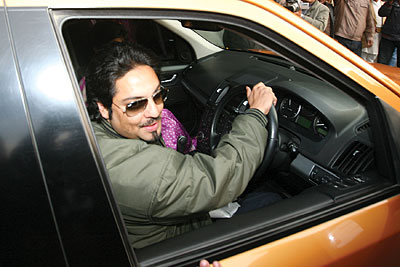 KIRAN PANDAY |
Ex-minister Govinda Raj Joshi of the Nepali Congress may have thought he had beat the rap when in 2006, the Special Court quashed the charges of embezzling close to Rs 40 million laid against him by the Commission for the Investigation of Abuse of Authority. The Supreme Court has just ruled that the Special Court erred in absolving Joshi, who will now once more face charges of corruption.
Supreme Court justices have had a torrid time of late. The recently nominated Girish Chandra Lal was lambasted for having used his discretion to limit jail sentences for two rhino poachers to five years. Now it's Justice Rana Bahadur Bam's turn to be accused of improper conduct for having released repeat offenders � later involved in Bhaktaman Shrestha's abduction � on very low bail instead of sending them into custody.
If Chief Justice Ram Prasad Shrestha has his way, Joshi will end up behind bars, and Bam will lose his place in the Supreme Court. Bold moves, indeed, and ones that will set groundbreaking precedents.
But it is perhaps the third case, that of former crown prince Paras Shah, that constitutes the boldest move of all.
Paras Shah's arrest for allegedly firing an illegal pistol following an altercation with Bangladeshi national (and Deputy Prime Minister Sujata Koirala's son-in-law) Rubel Chaudhary is hugely significant. It represents the first time the Nepali state has attempted to hold a Nepali royal to account for his actions. Granted, he will most likely pay a fine at most, and then promptly leave the country under a cloud. But it also demonstrates how far some former royals are removed from the Nepali public and norms of civilised behaviour, and how much slimmer their chances are of being resurrected, even as a ceremonial institution. This, despite the best efforts of former king Gyanendra and Paras' wife, Himani.
Ironically, Shah has received support from the Maoists, who are accusing the government of 'politicising' the issue, and suggest that India might have orchestrated the whole affair. However murky the backgrounds of both protagonists in the incident are, both Shah and Chaudhary initially told the media that the former fired a pistol, though not at the latter, but in the air. This is indisputable. Even if Chaudhary had provoked Shah, which seems unlikely given the erstwhile prince's long-standing reputation for violence, there is no justification whatsoever for the use of firearms. To defend such an action is extremely poor judgment on the part of the Maoists.
The only other people to be protesting the arrest of Shah are of course diehard royalists and RPP-N cadres, whose leader Kamal Thapa met with Maoist Chairman Dahal a few months ago to discuss how to form a 'nationalist alliance'. This is clearly what has prompted the Maoist response, but it only reinforces the fear of the other political parties that the royalists and Maoists share little more than an opportunistic nationalism and a love of authoritarianism. The government, for its part, has already distinguished itself by taking Shah into custody, and should allow due process to be followed rather than give in to political pressure and street protests.
We all know the Maoists have plenty of reasons to criticise Nepali Congress and UML. This doesn't mean they can't agree with them on anything. At the end of the day, we're all on the same flight. When someone starts shooting, you're better off worrying about holes in the fuselage, not who's shooting their mouth off.
READ ALSO:
Hollow loktantra, PRASHANT JHA
Aiding impunity, DAMAKANT JAYSHI
Alone in the echo chamber, INDU NEPAL


